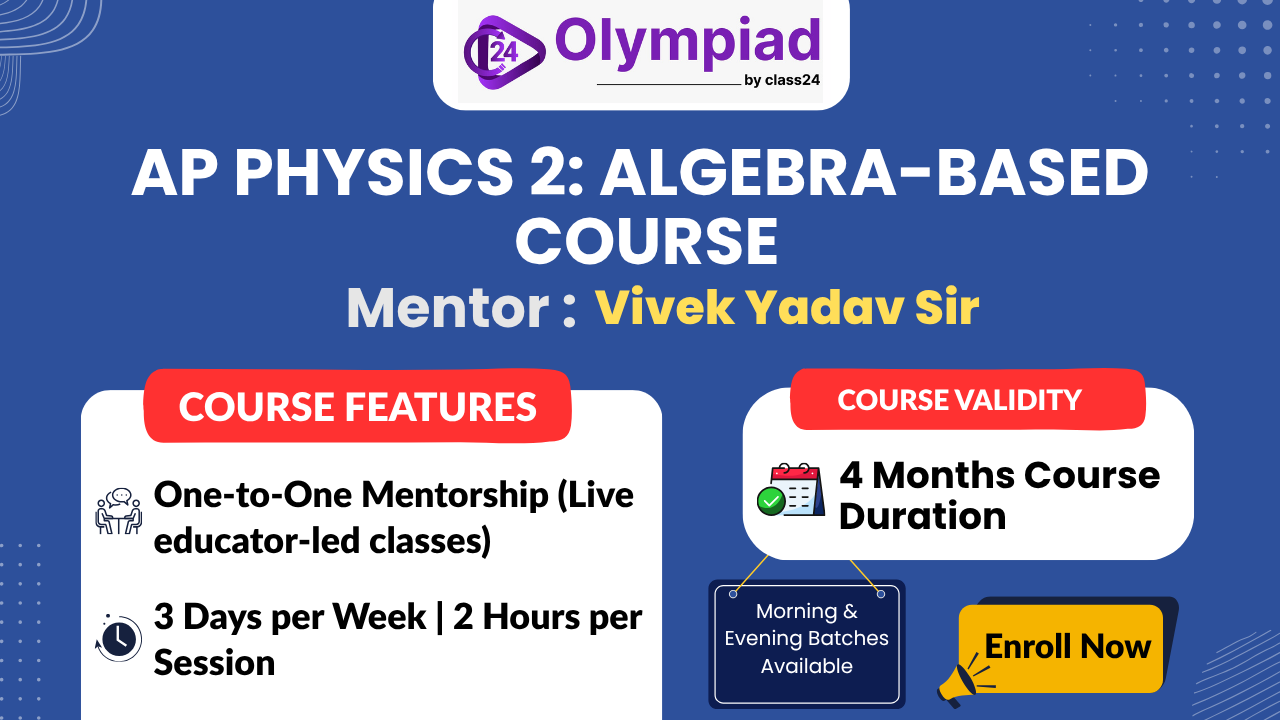AP Physics 2: Algebra-Based 2025 – Master Thermodynamics, Electromagnetism, Optics & Modern Physics
AP Physics 2: Algebra-Based is an advanced physics course that extends the foundation built in AP Physics 1. This course explores thermodynamics, electricity and magnetism, circuits, optics, waves, and modern physics through algebra-based problem-solving and hands-on laboratory work. Students investigate real-world applications, from static electricity to nuclear reactions, while strengthening their analytical and reasoning skills. With structured units, interactive labs, and exam-focused preparation, AP Physics 2 helps students earn potential college credits, develop higher-order STEM knowledge, and prepare for careers in science, research, and engineering.
About the Course
AP Physics 2 is also an algebra-based course that explores how the interactions of microscopic particles lead to observable phenomena such as static electricity, thermodynamic processes, nuclear reactions, and atomic emission lines. Students engage in hands-on laboratory work to investigate specific phenomena while learning key course concepts related to thermodynamics, electricity and magnetism, and quantum, atomic, and nuclear physics.
Course Units:
The AP Physics 2 curriculum covers a range of advanced topics:
- Unit 9: Thermodynamics - Studies heat, temperature, and thermal energy within contexts such as heat engines, heat pumps, and refrigerators.
- Unit 10: Electric Force, Field, and Potential - Begins the study of electromagnetism by introducing fundamental concepts like electric charge and electric forces.
- Unit 11: Electric Circuits – Continues the examination of charged particle behaviour to understand circuit components and the path of electric currents.
- Unit 12: Magnetism and Electromagnetism – Builds on knowledge of electrostatic forces and fields to explore relationships between moving electric charges (currents) and the magnetic forces and fields they generate.
- Unit 13: Geometric Optics – Introduces different perspectives on how light interacts with materials and how images are formed by mirrors and lenses.
- Unit 14: Waves, Sound, and Physical Optics –Introduces the study of waves, including quantification methods (amplitude, wavelength, period, frequency, wave speed), and models light as a wave.
- Unit 15: Modern Physics – Introduces concepts of modern physics and explains how new models resolve conflicts and questions unanswered by Newtonian physics.
Professional Online Tutoring in Science & Math
Unlock your child’s true potential with expert-led, interactive online classes that make complex concepts simple, spark curiosity, and build lasting confidence in STEM subjects.
- Customized learning plans for every grade
- Live, engaging sessions with experienced educators
- Globally aligned curriculum for future-ready skills
Book a 1-on-1 Counseling Session

Benefits of AP Physics 2
- High-order STEM foundation: Enhance college-level knowledge in physics, engineering, and scientific research.
- Practical learning: Put theory into practice based on experiments and simulations that reflect practical uses of the theory.
- Problem-solving and critical thinking: Build critical thinking and quantitative problem solving of complex physics problems.
- College credit opportunity: Study to take the AP Physics 2 exam and get possible credits to speed up your college work.
- Relevance in daily life: Learn the science of common everyday things, such as refrigeration, or the effect of magnets.
Why Choose Us
The course is AP Physics 2 on which we provide an interesting and conducive learning atmosphere:
Professional teachers
Get taught by teachers with years of experience in AP Physics and proven strategies for success.
Interactive curriculum
Engage in labs, simulations, and guided exercises to deeply understand every concept.
Individualized instruction
Receive personalized guidance tailored to your learning needs and speed.
Exam-based training
Master AP-type questions, improve time management, and learn test-taking strategies for high scores.
What We Offer?
By taking AP Physics 2, students have access to:
- Detailed course notes on each unit and idea.
- Simulation and laboratory experiments to support learning.
- Problem solving step-by-step instructions and practice.
- Simulations and mock tests of AP exam to enhance confidence and performance.
- Frequent doubt-clearing and individual mentoring.
- To have mastery of all topics, progress tracking tools will be employed.
AP Physics 2: Algebra-Based (Test-1)
Download the complete AP Physics 2: Algebra-Based Practice Test-1 including both Multiple-Choice Questions (MCQs) and Free Response Questions (FRQs). This test follows the official exam pattern to help you master advanced physics topics like Fluids, Thermodynamics, Electricity, Magnetism, Optics, and Modern Physics.
AP Physics 2 – Test-1 (Full Paper)
- Section I: 40 Multiple-Choice Questions | 1 hour 20 min | 50% of total score
- Section II: 4 Free-Response Questions | 1 hour 40 min | 50% of total score



